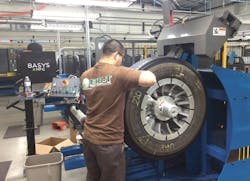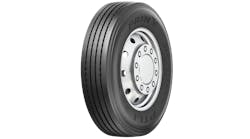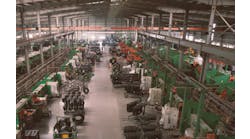The relentless flow of Tier 4 medium truck tires from China continues to challenge the profitability of retreading operations. Respondents to Modern Tire Dealer’s annual survey of the nation’s largest commercial tire dealers expect no relief. In a culture obsessed with getting the best deal on every purchase, the prices of truck tires from China are too low for their customers to ignore.
There seems to be “no bottom” to prices on Chinese built truck tires right now, according to Denny Seppanen, director of marketing-truck for Tredroc Tire Services Inc. There is also no consistency and no bottom in quality either. The Elk Grove Village, Ill.- based company operates 17 commercial outlets and four retread shops.
Seppanen says many customers are unaware that there is no enforceable manufacturer’s liability insurance on many of the Chinese imports. “That’s a dangerous place to be” when selling and mounting these tires.
Seppanen advises customers to “choose wisely” when purchasing offshore products and suggests doing business with a reputable tire dealer. Retreading demand has suffered from the low-cost imports, but the educated consumers still know the total value and safety of a quality-built retread. And that is not to mention the importance of recycling to the environment.
Low-cost Chinese tires affect every dealer in the marketplace, according to Tom Bowman, vice president of the commercial division for Belle Tire Distributors Inc. “As indicated in 2014 and much more in 2015, the Chinese imports in the Tier 4 categories continue to drive the price margins down in North America. This will continue to be a major problem as we enter 2016.” The Allen Park, Mich.-based company’s operations include three commercial outlets, three combined commercial-retail stores and three retread shops.
Tier 4 Chinese tires with a casing warranty are a recent phenomenon. “All of a sudden they have a casing warranty on it,” says Bowman. They are trying to get into this marketplace, they are trying to get into this niche, and they are saying their products are just as good as the products from the American companies. The quality is not there.”
David Stevens, managing director of the Tire Retread and Repair Information Bureau (TRIB), points out that there are quality Chinese products that can be retreaded and are competing directly with some of the Tier 2 and Tier 3 products. “The problem remains in Tier 4 where it’s incredibly low price and low quality,” he says. “That’s the segment that’s hurting retreading because the pricing gets very close to the price of the retread. The Chinese companies that are focused on a very low price are the ones I’m concerned about.”
New tires trump retreads
The low cost of Tier 4 products exploits a challenge the retreading industry has always had, according to Stevens. “If you focus on the cost per mile or the total cost of ownership, retreading is still a great value because you’re able to invest in a quality casing that you can retread multiple times. If you take the initial investment plus the cost of doing a retread two or three times, your total cost per mile is driven down. Unfortunately, a lot of the people buying these Tier 4 products are just focused on the initial price. It’s a short-term decision that has long-term implications.”
Customers are looking at new versus used, not the technology in the tire’s casing. Using a premium casing guaranteed to be retreaded three times as an example, Stevens says a Chinese Tier 4 tire does not compare in terms of structure and engineering. “It’s completely different at a much lower grade; it’s just not the same product. But they are comparably priced. People are making that buying decision on the initial price and not the total cost of ownership.”
Chinese tires and buyers not understanding cost per mile is “one of the sorriest things” Rick Majewski says he’s sees. “People don’t look at long-term costs, they look at acquisition cost, that’s the problem,” says Majewski, who is vice president of Wilson County Tire and Retreading in Lebanon, Tenn. “There are so many Chinese tires out there now it’s ridiculous. I’m not saying they are all bad, there are some that are fairly decent. But I would never put a Chinese steer tire on any vehicle. They just aren’t round. They just aren’t worth the money.” Wilson County Tire and Retreading is part of Sumerel Tire Service Inc., which is based in Newport, Ky.
Pooler, Ga.-based Dorsey Tire Co. Inc. does a lot of intermodal business, a segment that favors the Tier 4 Chinese products, according to Bruce Chamblee, managing partner and general manager. “Our new tire sales are way up and our cap casing retread sales are way down. The Chinese tires have devastated my cap and casing business. It’s causing casing surpluses, which starts to drive casing values down.” The company operates a retread shop, a commercial outlet and a combination store which provides mostly commercial sales and service.
Chamblee says the high volume of Chinese tires has affected sales of cradle-to-grave programs to smaller fleets. “They look at Chinese tires and see some of these tires are getting to the point where the retreading is about as expensive as the Tier 4 product. So it’s really created a lot of competition in the retreading world. We’ve had to become more creative as far as how we sell our cap and casing programs with customers.”
High volumes of low-cost Chinese tires are also affecting Pete’s Road Service Inc. of Fullerton, Calif. “With the influence of Chinese tires it seems like anyone can get anything dirt cheap,” says Rob Mason, who is sales and marketing director for the company. “Small operators with one truck and a compressor are buying whatever is on special from a wholesaler, in many cases less than the retreads we offer,” he says. “A lot of these guys will make $20 on a tire. They discount all of the labor from a company like ours; it makes it difficult to compete.” Pete’s Road Service operates nine commercial stores and one retread shop in southern California.
Mason says the impact of Chinese tires on the market has “really taken off” in the last year. “We sell Chinese tires because we have to. It just makes it difficult to compete when Chinese tires are so much less, and anybody can get their hands on anything inexpensive.” His company is a dealer for the Hankook, Toyo and Michelin brands.
Finding qualified employees is a major concern
The MTD survey asked dealers to name their greatest challenges. Nearly all who answered the question say finding and keeping qualified service personnel. Many rank it as their top concern. The response of George Hammon, director of sales at Commercial Tire Inc. in Meridian, Idaho, is typical: “The biggest challenge is hiring the right entry-level personnel, training them and retaining them through the period of time from entry level to experienced service techs, sales or management levels.”
Wholesalers, including American Tire Distributors, selling direct to end users is a relatively new challenge for Pete’s Tire Service. Says Mason: “We’ve noticed they’ll actually drop shipments direct to the customer and call out the small independent guys with just the truck and their own business to come and do the discounted labor on it.”
At Black’s Tire Service Inc., which is based in Whiteville, N.C., the biggest issue is shrinking profit margins in the large truck business. Says Rick Benton, vice president: “The problem is it costs so much to be a full-service commercial dealer these days. The challenge is to still be profitable and keep the inventory that’s needed. But the profit margins are not what they need to be to get the service we need to provide. The shrinking profit margins are a big concern in that segment of our business. The other is the cost of the service trucks.”
Like many survey respondents, Benton cited rising costs for health care insurance and employee training as major challenges. “Insurance is a huge, huge cost to us now. It’s making it hard for not only us but the fleets we do business with. It all goes back to the pressure on margins. Our partners in the business have to work with us to find ways to be more profitable. Costs are not going down so we have to find ways to be more profitable.”
Dealers are applying a variety of strategies to improve their competitiveness. “As we continue to increase our retread capacity the biggest hurdle is finding people who want to learn,” says Belle Tire’s Bowman. “We continue to struggle in finding the right people, but when we do we spend ample time in training them to our standards. We have an ongoing training program to assure our quality of service.”
Nebraskaland Tire Co. Inc. which does business as Nebraskaland Tire, Kansasland Tire and Coloradoland Tire, has taken steps to increase hiring and retention of employees, according to Nick Phillippi, general manager. “We have added new equipment and added training and ergonomics into the plants for employee performance and satisfaction reasons.”
Ziegler Tire and Supply Co. in Massillon, Ohio, is focusing on increasing revenues and training. President Bill Ziegler says the company is making a “very concerted effort to increase out labor sales in the commercial business to include increased light mechanical revenues. We continue to support TIA training for all of our tire technicians.”
Commercial Tire remodeled some locations to accommodate more drive-through truck traffic, purchased new truck alignment equipment and expanded its website. Callaghan Tire Inc. of Bradenton, Fla., moved its corporate office out of the same building as its retread plant. The move allowed Callaghan to expand the retread plant and the shipping and receiving department to better serve customers and stores.
Some dealers are adding locations. McWhorter’s Ltd. has opened its seventh location in western Texas. The commercial tire dealer’s newest outlet is in Midland.
“Even though we officially opened a branch in 2015, McWhorter’s has worked in the Midland area with commercial fleets for years,” says Rock Rickel, president. “We look forward to our long-term commitment to businesses in and around Midland and Odessa.”
Despite the depressed price of oil, McWhorter’s has targeted an expansion to Midland and Odessa for some time and views the local economy and location as a strong opportunity for sales decades from now. The company is based in Lubbock, Texas.
Large national account business forced McCarthy Tire Service Inc. to continue to expand retread facilities and open new ones, according to Neil Horn, vice president. The company made several acquisitions over the last year to expand its geographic coverage and service offerings. They are: Commercial Truck Tire Center in Syracuse, N.Y., which provides commercial tire sales and service; Hartman Fleet Services Inc., a Manassas, Va.-based provider of heavy mechanical services, fleet maintenance and repair, and mobile mechanical services to the northern Virginia, Maryland, and Washington, D.C., markets; and Ragan Tire Group LLC, which provides off-the-road (OTR) tires and tire service to heavy construction, quarrying and mining customers in North Carolina, South Carolina and Georgia.
In central California, two independent commercial dealers joined forces to build a 20,000-square-foot retreading plant that uses the Bandag process. Eco-T Tire and Retreading is a joint venture between Tulare Firestone Inc., which does business as TF Tire & Service, and Country Tire and Wheel Inc. Tulare Firestone is based in Tulare and Country Tire and Wheel is based in Bakersfield. The plant’s production flows solely to the two companies, according to Kevin Pires, director of marketing and logistics for Tulare Firestone.
Pires says both companies could have supported their own small plant for medium truck tire retreading but felt it was more efficient to combine for one large plant. He says the companies serve different markets. Country Tire and Wheel serves the oil and transportation industries through four stores which also provide retail sales and service. TF Tire and Service serves mainly small fleets in the agriculture industry.
“Most of our customer base hauls agriculture commodities in some form,” says Pires. The company has one wholesale, two retail, two commercial, and seven combination locations as well as an auto parts distribution division. The company retreaded tires decades ago, but left the business in 1981. “Over the years we have outsourced retreading. We felt a new retread shop was a way to solidify our position as a full-service dealership.”
Relief for retreaders?
George Thaler owns Intercontinental Marketing Corp. (IMC), a Minneapolis, Minn.-based importer of Japanese casings. He follows international markets closely. In his opinion, the availability of low-cost passenger and truck tires may soon drop.
In 2009, China’s government loosened credit conditions in an attempt to stimulate growth. This encouraged factories to acquire loans which they used to expand. As factories were expanding, China’s domestic economy began to slow. Thaler says pricing for raw materials like rubber, steel and oil have recently decreased partly because China is not increasing its consumption at the rate it used to.
“They are still producing 20% to 25% too many medium truck tires, and they are dumping these tires everywhere. All over the world casing purchases are down because Chinese tires are so cheap. It’s impacting retreading in many countries. They (the Chinese tire companies) are losing money. Their profit margins have shrunk. A lot of these companies are highly leveraged. They need cash to stay current on their loans. I think you will probably see more and more of these factories fold.”
China’s shrinking economy has hurt its trucking industry, too. The demand for truck tires in China is reduced. Tire companies have been going to the global market but the global market is contracting.
“There’s a lot of factors that play into it but the prices they are selling tires at right now, if you look at their warehouse capacity, their factories are only working at 70%, and I think you need 85% for a factory to be profitable. You can’t do that forever. If things are as bad as it looks from what I see, all of a sudden many of these people that are buying all these Chinese tires may be without tires. If that happens there will be a big demand for retreads and non-Chinese tires to fill the void.”
TRIB’s Stevens also sees changes ahead. “There’s a lot of factors influencing the Chinese tire industry. There’s going to be painful consolidation. Many of these factories are operating at a loss. The government has helped support them up to a point, but the stock market has been tanking so access to money has tightened up. There’s stress from pricing of the natural rubber that’s influencing them as well. The tire tariffs on passenger tires are starting to have an impact.
“Those fleets that have a tire management program will start to see the return on investment of retreaded tires. The challenges in the Chinese tire industry will have some influence. At the same time there will be those medium to big Chinese companies that do want to move up the scale in terms of quality. That then hopefully creates opportunity to retread those tires.”
Mason believes tire quality will bring customers back to retread products. “I think over the course of time when people realize the problems and lack of warranty and craftsmanship of Chinese tires, and how quickly they wear out, they are going to start to see the difference. There hasn’t really been enough time for people to compare mileage and cost per mile to what they were buying if they were buying a better product.” ?
To see our "Top 25 commercial tire dealers in 2015" chart, click here.




